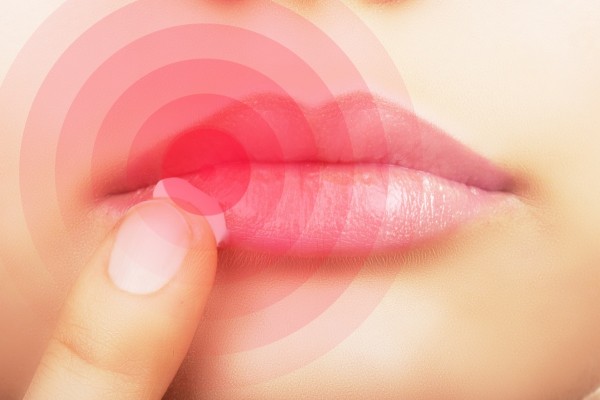Mouth sores are associated with different medical conditions. Diagnosing the cause of a mouth sore is the first step in knowing how to manage it. Your dentist or oral surgeon should be consulted if the sore lasts for longer than ten days to two weeks.
Most common causes of mouth sores are:
- Viral infections such as herpes simplex, herpes zoster and HIV
- Recurrent canker sores otherwise known as aphthous stomatitis
- Infections caused by fungi or bacteria, such as candidiasis (yeast), syphilis, gonorrhea or an abscess
- Tobacco and alcohol use
- Cancer treatment such as chemotherapy drugs and radiation therapy
- Systemic disorders such as nutritional deficiencies, IBS, allergic reactions
- Injury caused by braces, dentures, irritating food or chemicals
Viral Infections
The most common infectious causes of mouth sores are viruses. Cold sores caused by the herpes simplex virus (which never leaves the body) are probably the most commonly known, but there are many other viral infections to consider. Varicella-zoster, which causes chicken pox, can flare up as shingles and cause multiple sores on one side of the mouth. In some cases, the mouth remains painful for months or even permanently, even after the sores have healed.
Hand, foot and mouth disease, which is a virus, is usually seen in children but can affect adults as well.
Canker Sores
Canker sores can be caused by injury such as biting your cheek, ill-fitting dentures or orthodontia. These injuries should heal on their own in 7 to 10 days. If they are severe and ongoing, you may require some medical tests to check for a systemic problem such as Crohn’s disease, celiac disease, reactive arthritis, Behcet’s disease or even a nutritional or vitamin deficiency.
Fungal or Bacterial Infections
A fungal infection called candidiasis is caused by an overgrowth of the yeast organism Candida albicans. It is commonly seen in people who have taken antibiotics, corticosteroids or are immune-compromised, such as someone with AIDS. It often causes difficulty swallowing, as it can spread to the throat. It is easily treated with an antifungal medication.
A bacterial infection can cause swelling and sores in the mouth. Bacterial infections from the gums or teeth can cause a pus-filled pocket to form and it is referred to as an abscess.
The bacteria that cause syphilis and gonorrhea can cause mouth sores. A mouth sore caused by syphilis is referred to as a chancre and is highly contagious in the early stages and kissing may spread the disease. Bacterial infections are treated with antibiotics.
Tobacco and Alcohol
Tobacco and alcohol are both irritants to the mouth and can cause oral cancer. Due to the highly carcinogenic nature of tobacco and smokeless tobacco products, a majority of oral cancers (70%), are caused by tobacco products. Leukoplakia (a white patch that develops anywhere in the mouth) and Erythroplakia (a red patch that develops anywhere in the mouth), are conditions often caused by smoking and alcohol consumption. Although these conditions are not always indicative of cancer, they are often, after a biopsy, found to be precancerous or cancerous lesions.
Cancer Treatment
Chemotherapy and radiation treatments can cause mouth sores. They usually appear one to two weeks after receiving chemotherapy treatment (not all chemo causes mouth sores). They can also be caused by radiation treatments to the head and neck area. Healing can take anywhere from two to four weeks.
Systemic Disorders
Nutritional deficiencies of iron, vitamin B and vitamin C may cause mouth sores. Other systemic causes of mouth sores are Behcet disease (an inflammatory disease), Stevens-Johnson syndrome (a type of allergic reaction), celiac disease (gluten sensitivity) and inflammatory bowel disease have all been known to cause mouth sores.
Oral Cancer
Oral cancer usually appears as a red or white lesion, bump or ulcer. It can grow and spread quickly, so early diagnosis is crucial for the best outcome possible. If your health care provider suspects a lesion is malignant, they will do a biopsy.
Lichen-Planus, which presents as white spots or thin fine lines, very rarely turns into oral cancer, but it is possible. If you are diagnosed with this condition, you should have regular oral checks and discontinue use of tobacco and alcohol.
The human papillomavirus (HPV) is a sexually transmitted disease that can turn into oral cancer. Most oropharyngeal cancers (70%) in the United States are caused by HPV.
Evaluation and Treatment
Mouth sores can be very painful and lead to weight loss, dehydration and poor eating. They should be taken very seriously, especially if they last longer than ten days to two weeks.
Depending on your diagnosis, there are different ways to treat mouth sores. Topical treatments, which are substances applied directly to the affected part of your mouth, can provide temporary relief. These include anesthetics, protective coatings, corticosteroids or cautery (burning with a laser or chemicals). If you suffer from a nutritional deficiency, then adding these vitamins or minerals back into your diet are imperative. If it is a bacterial infection, then your dentist will order an antibiotic for you. If it is viral, then you can treat the symptoms but will have to wait for the virus to pass. Some mouth rinses and corticosteroids can help relieve the pain.
Practicing good oral health means taking care of more than your teeth. Your mouth is a very vulnerable part of your body and it is important to have regular dental checkups. If you are having difficulty with mouth sores, please make an appointment at Good Samaritan Dental Implant Institute for a consultation. Getting a diagnosis and recommendation for treatment will help you keep smiling!

